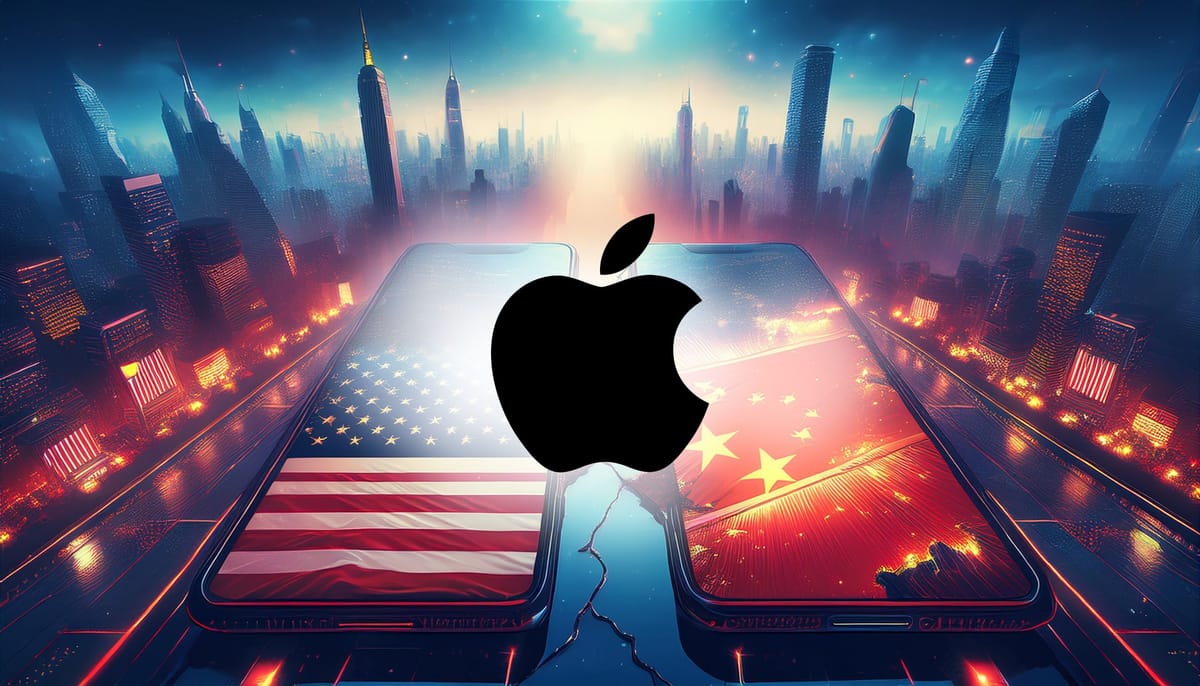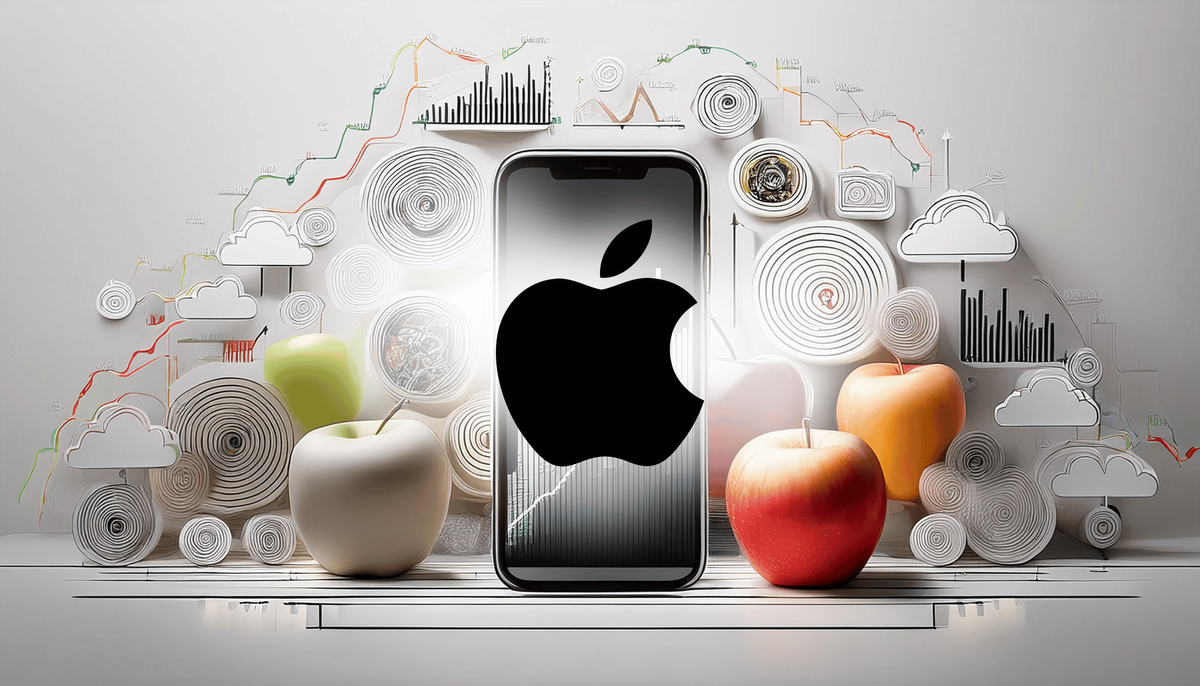In the fast-paced world of technology, even giants like Apple face their share of challenges. Recent developments have put the spotlight on the Cupertino-based company, as it grapples with declining iPhone sales and a significant antitrust lawsuit. This comprehensive analysis delves into Apple's current market position, the factors contributing to its revenue challenges, and the potential implications for its future.
The Changing Landscape of iPhone Sales
Apple's iPhone, once the undisputed king of the smartphone market, is showing signs of vulnerability. In the first half of 2024, iPhone sales revenue dropped by a substantial $2.7 billion year-over-year, totaling $85.2 billion. This decline is part of a broader trend that has seen Apple's dominance in the global smartphone market wane.
The company's market share has been under pressure, with iPhone unit shipments as a share of global smartphone shipments declining to 15.8% in Q2 2024, down from 16% in the same period last year. This shift in the market dynamics is particularly noteworthy given Apple's historical position as a market leader.
Despite these challenges, Apple's CEO, Tim Cook, maintains an optimistic outlook. During a recent earnings call, Cook stated:
"Today Apple is reporting a new June quarter revenue record of $85.8 billion, up 5 percent from a year ago."
This statement highlights the company's ability to generate growth in overall revenue, even as iPhone sales face headwinds. However, it's essential to look beyond the top-line numbers to understand the full picture of Apple's current situation.
Factors Contributing to the iPhone Sales Decline
Several factors have contributed to the decline in iPhone sales, each playing a role in reshaping Apple's position in the smartphone market.
Market Saturation and Increased Competition
One of the primary challenges Apple faces is market saturation in key regions, particularly in developed markets where smartphone penetration is already high. This saturation has made it increasingly difficult for Apple to maintain its previous growth rates.
Moreover, the competitive landscape has intensified, with rising competition from Chinese brands like Xiaomi and Oppo. These companies have been gaining market share with their feature-rich, competitively priced devices, putting pressure on Apple's premium pricing strategy.

Even Samsung, Apple's long-standing rival, has felt the impact of this shifting market. The South Korean giant saw its market share decline from 20% in Q2 2023 to 18.9% in Q2 2024, indicating that the challenges in the smartphone market are not unique to Apple.
Changing Consumer Preferences
Consumer preferences and expectations are evolving rapidly in the smartphone market. While Apple has long been known for its innovation, there's growing interest in new technologies and features that go beyond traditional smartphone capabilities.
For instance, there's significant buzz around Apple's forthcoming artificial intelligence features, which were unveiled during the company's annual Worldwide Developers Conference (WWDC) in June. These AI capabilities, including enhancements to Siri and other intelligent features, are expected to be available on the iPhone 15 Pro models and newer versions.
This focus on AI and advanced features reflects a shift in what consumers are looking for in their devices. It's no longer just about having a sleek design or a powerful camera; users are increasingly interested in how their smartphones can integrate with and enhance their daily lives through intelligent features and seamless ecosystem integration.
Regional Challenges: The China Factor
Apple's performance in China, one of its most crucial markets, has been particularly concerning. Sales in China fell by 6% to $14 billion, a steeper decline than the 2.4% decrease that analysts had anticipated. This underperformance in the Chinese market is significant, given the country's importance as both a consumer market and a manufacturing hub for Apple.
The company has fallen out of the top five smartphone manufacturers in China, surpassed by domestic competitors such as vivo, OPPO, and Huawei. This shift reflects the growing strength of local brands and the intensely competitive nature of the Chinese smartphone market.
The Antitrust Lawsuit: A New Challenge for Apple
Adding to Apple's challenges is a significant antitrust lawsuit filed by the U.S. Department of Justice (DOJ). This legal action accuses Apple of monopolizing the smartphone market through its locked-down iPhone ecosystem. The lawsuit could potentially have far-reaching implications for Apple's business model and its relationship with users and developers.

Key Allegations in the Lawsuit
The DOJ's lawsuit alleges that Apple engages in anticompetitive practices across several areas of its business. Specifically, the allegations include:
- Blocking "super" apps that could potentially compete with Apple's ecosystem.
- Suppressing mobile cloud streaming services that might challenge Apple's App Store model.
- Blocking cross-platform messaging apps, maintaining the exclusivity of iMessage.
- Limiting third-party digital wallets, protecting Apple Pay's position.
- Restricting the functionality of third-party smartwatches on Apple platforms.
These allegations strike at the heart of Apple's integrated ecosystem strategy, which has been a key differentiator for the company.
Deputy Attorney General Lisa Monaco emphasized the severity of the allegations, stating that Apple's efforts "smothered an entire industry." This strong language underscores the DOJ's view that Apple's practices have had a significant impact on competition and innovation in the tech sector.
Apple's Response and Potential Implications
Apple has vehemently denied the allegations. Fred Sainz, an Apple spokesperson, responded to the lawsuit by saying:
"This lawsuit threatens who we are and the principles that set Apple products apart in fiercely competitive markets."
This statement reflects Apple's position that its ecosystem and business practices are fundamental to its identity and success. The company argues that its integrated approach provides security, privacy, and a seamless user experience that consumers value.
However, if the lawsuit is successful, it could potentially upend many of the ways Apple currently operates its iPhone ecosystem. This could lead to significant changes in how apps are distributed, how Apple interacts with developers, and even how the iPhone integrates with other devices and services.
It's worth noting that this is the third time in 14 years that the DOJ has sued Apple for antitrust violations. This pattern suggests ongoing scrutiny of Apple's business practices and potentially signals a broader shift in how regulators view big tech companies and their market power.
Apple's Diversification Strategy
In response to the challenges in the iPhone market, Apple has been actively pursuing a diversification strategy. This approach aims to reduce the company's reliance on iPhone sales and create new revenue streams.
Growth of Services Segment
One of the most successful aspects of Apple's diversification efforts has been the growth of its Services segment. This category includes offerings such as the App Store, Apple Music, Apple TV+, iCloud, and Apple Pay. The revenue share of these services has grown significantly, rising from roughly 5% in 2017 to nearly 30% in Q3 FY 2024.
This shift towards services not only provides a more stable and recurring revenue stream but also helps to lock users into the Apple ecosystem. As users become more invested in Apple's services, they are more likely to remain loyal to the brand and continue purchasing Apple hardware.
Focus on Wearables and Accessories
While specific data on wearables and accessories wasn't provided in the search results, it's important to note that products like the Apple Watch and AirPods have become increasingly important to Apple's overall strategy. These devices extend the Apple ecosystem beyond the iPhone, creating additional touch points with consumers and new revenue opportunities.
Investing in Artificial Intelligence
Apple is making significant strides in the field of artificial intelligence, recognizing its potential to transform user experiences and create new product categories. During the recent WWDC, Apple unveiled new generative AI tools that will be embedded in the operating systems of its devices.
One notable development is Apple's collaboration with OpenAI to enhance Siri, its voice assistant. This partnership signals Apple's commitment to improving its AI capabilities and keeping pace with competitors in this rapidly evolving field.
Luca Maestri, Apple's CFO, highlighted the company's focus on innovation:
"We are also very pleased that our installed base of active devices reached a new all-time high in all geographic segments, thanks to very high levels of customer satisfaction and loyalty."
This statement underscores Apple's strategy of continually enhancing its ecosystem to maintain customer loyalty and drive long-term growth.
Future Outlook and Projections
As Apple navigates these challenges, the future outlook for the company remains a topic of intense discussion among industry analysts and observers. Several key factors will likely shape Apple's trajectory in the coming years.
The Evolution of the iPhone-Centric Business Model
While iPhone sales have declined as a percentage of Apple's overall revenue, dropping from 48% last year to 46% this year, the device remains central to Apple's business model. The company's ability to innovate and differentiate the iPhone in an increasingly crowded market will be crucial.
Analysts will be closely monitoring how Apple's AI announcements and other technological advancements influence future iPhone sales. The integration of more advanced AI features could potentially reignite consumer interest and drive upgrade cycles.
Opportunities and Threats in the Evolving Tech Landscape
Apple faces both opportunities and threats as the tech landscape continues to evolve. On one hand, the company's strong brand, loyal customer base, and deep pockets position it well to capitalize on emerging technologies and market trends. The growing interest in AI and the potential for new product categories (such as augmented reality devices) could open up new avenues for growth.
On the other hand, Apple faces increasing competition not just in hardware, but also in services and AI capabilities. Companies like Google, Amazon, and Microsoft are making significant strides in AI, potentially challenging Apple's position as a leader in user-friendly, innovative technology.
The Impact of Regulatory Scrutiny
The ongoing antitrust lawsuit and broader regulatory scrutiny of big tech companies could have significant implications for Apple's future. If regulators force Apple to open up its ecosystem or change its App Store policies, it could impact the company's revenue streams and its ability to control the user experience.
However, it's worth noting that Apple has navigated regulatory challenges in the past and has shown an ability to adapt its business practices while maintaining its core principles.
Conclusion
Apple finds itself at a critical juncture, facing challenges on multiple fronts. The decline in iPhone sales, intensifying competition in key markets like China, and the looming antitrust lawsuit all present significant hurdles for the company to overcome.
However, Apple's history of innovation, strong brand loyalty, and growing services business provide reasons for optimism. The company's investments in AI and other emerging technologies demonstrate its commitment to staying at the forefront of the tech industry.
As Apple continues to evolve its strategy and product lineup, it will need to balance maintaining its premium brand positioning with adapting to changing market dynamics and consumer preferences. The company's ability to navigate these challenges while continuing to innovate will be key to its long-term success.
The tech industry remains highly dynamic, and Apple's future will depend on its ability to anticipate and shape emerging trends. While the road ahead may be challenging, Apple's track record of resilience and innovation suggests that it is well-positioned to adapt and thrive in the face of these obstacles.
As the situation continues to unfold, all eyes will be on Apple's next moves. Will the company be able to reignite iPhone sales growth? How will it respond to the antitrust challenges? And what new innovations might it introduce to captivate consumers once again? The answers to these questions will not only shape Apple's future but will likely have profound implications for the broader tech industry and global markets.






